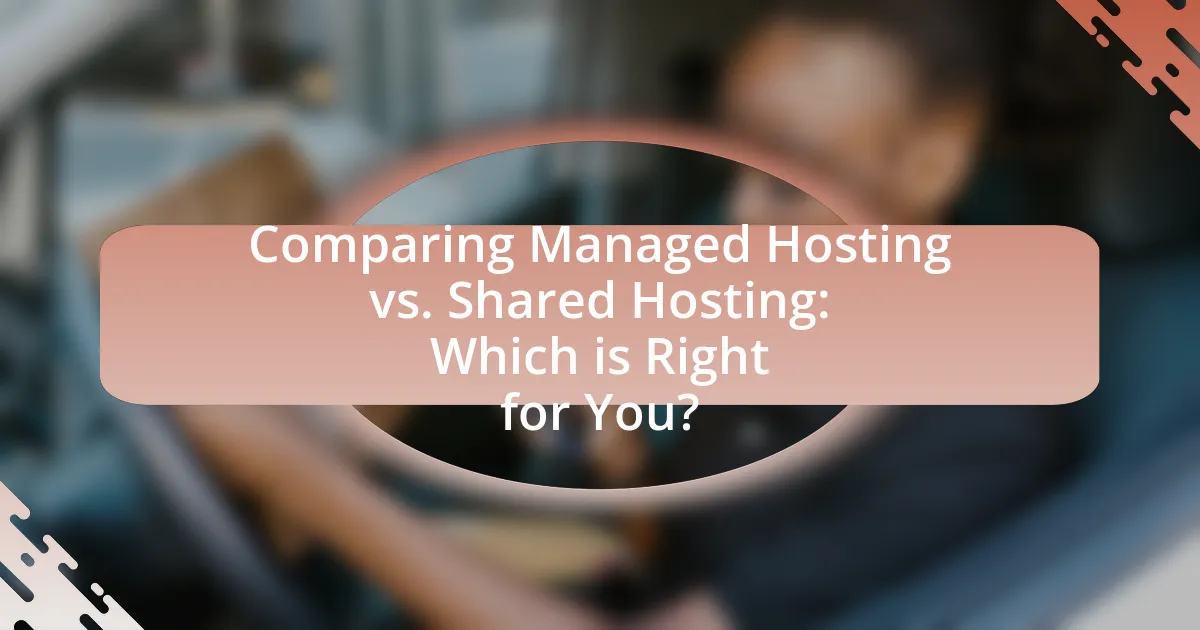The article focuses on comparing managed hosting and shared hosting, two distinct web hosting options. Managed hosting provides dedicated resources, expert support, and enhanced security, making it suitable for businesses with high traffic and specific technical needs. In contrast, shared hosting allows multiple websites to share server resources, offering a cost-effective solution for small businesses and personal websites but with limitations in performance and security. The article outlines the key features, advantages, and potential drawbacks of each hosting type, helping readers determine which option aligns best with their specific requirements and budget.

What are Managed Hosting and Shared Hosting?
Managed hosting is a service where a hosting provider takes care of all the technical aspects of server management, including maintenance, security, and updates, allowing businesses to focus on their core activities. In contrast, shared hosting involves multiple websites sharing the same server resources, which can lead to limited performance and security, as the actions of one site can affect others on the same server. Managed hosting typically offers better performance, security, and support compared to shared hosting, making it suitable for businesses with higher demands.
How do Managed Hosting and Shared Hosting differ?
Managed hosting provides dedicated resources and support for a single client, while shared hosting allocates resources among multiple clients on the same server. In managed hosting, the service provider handles server management, security, and maintenance, allowing clients to focus on their applications. Conversely, shared hosting requires clients to manage their own applications with limited support, as the server resources are shared, which can lead to performance issues during high traffic. This distinction is crucial for businesses that require reliability and performance, as managed hosting typically offers better uptime and faster load times compared to shared hosting.
What are the key features of Managed Hosting?
Managed hosting offers several key features that distinguish it from other hosting options. These features include dedicated resources, where clients receive exclusive access to server resources, ensuring optimal performance. Additionally, managed hosting provides expert support, with technical teams available to handle maintenance, updates, and troubleshooting, allowing businesses to focus on their core activities. Security is another critical feature, as managed hosting typically includes advanced security measures such as firewalls, DDoS protection, and regular backups to safeguard data. Furthermore, scalability is a significant advantage, enabling businesses to easily adjust their resources based on demand. These features collectively enhance reliability, performance, and security, making managed hosting a preferred choice for businesses with specific needs.
What are the key features of Shared Hosting?
Shared hosting is characterized by multiple websites sharing a single server’s resources, which includes CPU, RAM, and disk space. This setup allows for cost-effective hosting solutions, making it ideal for small businesses and personal websites. Key features include limited server resources, affordability, ease of use with user-friendly control panels, and basic technical support. Additionally, shared hosting typically offers pre-installed applications and one-click installations for popular content management systems like WordPress. The shared nature of the hosting environment means that performance can be affected by other websites on the same server, which is a crucial consideration for users.
What are the advantages of each hosting type?
Managed hosting offers advantages such as enhanced performance, dedicated resources, and expert support, making it ideal for businesses with high traffic and specific technical needs. In contrast, shared hosting provides cost-effectiveness and ease of use, making it suitable for small websites or personal projects with limited budgets. The performance of managed hosting is often superior due to dedicated server resources, while shared hosting allows multiple users to share server space, significantly lowering costs.
What benefits does Managed Hosting provide?
Managed Hosting provides enhanced performance, security, and support compared to other hosting options. This type of hosting ensures dedicated resources, which leads to faster load times and improved website performance. Additionally, Managed Hosting includes robust security measures, such as firewalls and regular updates, which protect against cyber threats. Furthermore, it offers expert technical support, allowing businesses to focus on their core activities while the hosting provider manages server maintenance and troubleshooting. These benefits collectively contribute to a more reliable and efficient hosting environment for businesses.
What benefits does Shared Hosting provide?
Shared hosting provides cost-effectiveness, making it an ideal choice for individuals and small businesses with limited budgets. This hosting type allows multiple users to share a single server’s resources, significantly reducing operational costs compared to dedicated hosting. According to a report by HostingAdvice, shared hosting plans can start as low as $2.75 per month, making it accessible for those just starting online. Additionally, shared hosting typically includes user-friendly management tools, which simplify website setup and maintenance, further enhancing its appeal for non-technical users.

Who should choose Managed Hosting?
Managed hosting is ideal for businesses and individuals who require high performance, security, and dedicated support for their websites or applications. Organizations with limited technical expertise benefit from managed hosting as it provides expert management of server infrastructure, allowing them to focus on their core business activities. Additionally, companies experiencing rapid growth or high traffic volumes should choose managed hosting to ensure scalability and reliability, as it offers resources tailored to their specific needs. According to a study by HostingAdvice, 70% of businesses reported improved performance and security after switching to managed hosting solutions, underscoring its advantages for those seeking robust hosting options.
What types of businesses benefit from Managed Hosting?
Businesses that require high performance, security, and reliability benefit from Managed Hosting. This includes e-commerce companies that need to ensure uptime and fast load times for transactions, SaaS providers that rely on consistent application performance, and enterprises with sensitive data that require robust security measures. According to a study by Gartner, 70% of organizations that utilize managed hosting report improved operational efficiency, demonstrating the tangible advantages for businesses that prioritize these factors.
How does Managed Hosting support high-traffic websites?
Managed Hosting supports high-traffic websites by providing dedicated resources, optimized performance, and expert management. This type of hosting allocates specific server resources exclusively for a single client, ensuring that high volumes of traffic do not lead to slowdowns or outages. Additionally, Managed Hosting includes features such as load balancing, which distributes incoming traffic across multiple servers, enhancing reliability and speed. According to a study by HostingAdvice, websites on Managed Hosting can handle up to 50% more traffic compared to those on Shared Hosting, demonstrating its effectiveness in managing high traffic loads.
What security features are essential for Managed Hosting users?
Essential security features for Managed Hosting users include firewalls, DDoS protection, regular backups, SSL certificates, and intrusion detection systems. Firewalls protect against unauthorized access, while DDoS protection mitigates denial-of-service attacks, ensuring website availability. Regular backups safeguard data integrity, allowing for recovery in case of data loss. SSL certificates encrypt data transmitted between users and servers, enhancing security and trust. Intrusion detection systems monitor for suspicious activities, providing alerts for potential breaches. These features collectively enhance the security posture of Managed Hosting environments, making them more resilient against various cyber threats.
What are the potential drawbacks of Managed Hosting?
The potential drawbacks of Managed Hosting include higher costs, limited control, and potential vendor lock-in. Higher costs arise because managed hosting services typically charge a premium for the convenience of management and support, which can be significantly more than shared hosting options. Limited control is a concern as users may have restricted access to server configurations and settings, which can hinder customization and flexibility. Additionally, vendor lock-in can occur when businesses become dependent on a specific provider’s infrastructure and services, making it difficult to migrate to another hosting solution without incurring substantial costs or downtime.
How does cost impact the decision for Managed Hosting?
Cost significantly impacts the decision for Managed Hosting by influencing budget allocation and perceived value. Businesses often evaluate the total cost of ownership, which includes not only the monthly or annual fees but also the potential savings from reduced downtime and improved performance. For instance, a study by Gartner indicates that companies can save up to 30% on operational costs by choosing managed services over traditional hosting solutions. This financial consideration leads many organizations to prioritize Managed Hosting for its scalability and support, ultimately affecting their choice between Managed Hosting and Shared Hosting.
What are the limitations of Managed Hosting?
Managed hosting has several limitations, including higher costs, reduced control, and potential vendor lock-in. The expense associated with managed hosting is significantly greater than shared hosting, as it includes dedicated resources and expert management. Users also experience limited control over server configurations and software choices, as the hosting provider typically manages these aspects. Additionally, reliance on a specific provider can lead to vendor lock-in, making it challenging to migrate to another service without incurring substantial costs or downtime. These factors collectively impact the flexibility and affordability of managed hosting solutions.

Who should choose Shared Hosting?
Individuals or small businesses with limited budgets and low to moderate website traffic should choose shared hosting. Shared hosting is cost-effective, as it allows multiple users to share the same server resources, significantly reducing costs. According to a report by HostingAdvice, shared hosting plans can start as low as $2.75 per month, making it an attractive option for startups and personal websites that do not require extensive resources or high performance.
What types of users benefit from Shared Hosting?
Shared hosting benefits small businesses, personal websites, and beginners in web development. These users typically require cost-effective solutions for hosting their sites without needing extensive technical knowledge. Shared hosting allows multiple users to share server resources, significantly reducing costs, which is ideal for those with limited budgets. According to a report by HostingAdvice, over 70% of websites are hosted on shared servers, indicating its popularity among users who prioritize affordability and ease of use.
How does Shared Hosting cater to small businesses and startups?
Shared hosting caters to small businesses and startups by providing an affordable and accessible web hosting solution that allows them to establish an online presence without significant financial investment. This type of hosting typically offers lower costs, with plans often starting as low as a few dollars per month, making it ideal for budget-conscious startups. Additionally, shared hosting services include essential features such as user-friendly control panels, one-click installations for popular applications, and customer support, which help small businesses manage their websites effectively. According to a report by HostingAdvice, 70% of small businesses prefer shared hosting due to its cost-effectiveness and ease of use, enabling them to focus on growth rather than technical complexities.
What are the cost advantages of Shared Hosting?
Shared hosting offers significant cost advantages primarily due to its affordability, as multiple users share the same server resources, leading to lower individual costs. This model allows hosting providers to distribute expenses such as server maintenance, electricity, and bandwidth among numerous clients, resulting in plans that can start as low as $2 to $10 per month. Additionally, shared hosting typically includes essential features like domain registration and email accounts at no extra charge, further reducing overall expenses for users. This cost-effective structure makes shared hosting an attractive option for small businesses and individuals who require basic web presence without the financial burden of dedicated resources.
What are the potential drawbacks of Shared Hosting?
The potential drawbacks of shared hosting include limited resources, security vulnerabilities, and performance issues. In shared hosting, multiple websites share the same server resources, which can lead to slower loading times and reduced performance during peak traffic periods. Additionally, the shared environment increases the risk of security breaches, as one compromised site can affect others on the same server. Furthermore, users have limited control over server configurations and software installations, which can hinder customization and optimization for specific needs. These factors collectively make shared hosting less suitable for high-traffic or resource-intensive websites.
How does performance vary in Shared Hosting environments?
Performance in Shared Hosting environments varies significantly due to resource allocation among multiple users on the same server. In these environments, the server’s CPU, RAM, and bandwidth are shared, leading to potential slowdowns during peak usage times or when one site consumes excessive resources. For instance, if one website experiences a traffic spike, it can negatively impact the loading speed and responsiveness of other sites hosted on the same server. This variability is further evidenced by studies showing that shared hosting can result in slower page load times, with average speeds ranging from 1 to 3 seconds, compared to dedicated or managed hosting solutions that typically offer more consistent performance metrics.
What security concerns should Shared Hosting users be aware of?
Shared Hosting users should be aware of several security concerns, including vulnerability to attacks from other users on the same server, limited control over security settings, and potential data breaches. In a shared hosting environment, multiple websites share the same server resources, which increases the risk of cross-site scripting (XSS) and cross-site request forgery (CSRF) attacks. Additionally, users often have restricted access to server configurations, making it difficult to implement robust security measures. According to a study by the Ponemon Institute, 60% of small businesses experience a data breach, highlighting the importance of understanding these risks in shared hosting scenarios.
How do you decide between Managed Hosting and Shared Hosting?
To decide between Managed Hosting and Shared Hosting, evaluate your website’s specific needs, technical expertise, and budget. Managed Hosting offers dedicated resources, enhanced security, and expert support, making it suitable for businesses with high traffic or complex applications. In contrast, Shared Hosting is cost-effective and ideal for smaller websites or personal projects with limited traffic, as it shares server resources with other users. According to a 2021 survey by HostingAdvice, 70% of businesses using Managed Hosting reported improved performance and security, highlighting its advantages for those requiring reliability and support.
What factors should you consider when choosing a hosting type?
When choosing a hosting type, consider performance, scalability, security, support, and cost. Performance is crucial as it affects website speed and user experience; for instance, managed hosting typically offers better performance due to dedicated resources. Scalability is important for accommodating growth; managed hosting allows for easier upgrades compared to shared hosting. Security features vary significantly; managed hosting often includes advanced security measures, while shared hosting may expose sites to vulnerabilities. Support is another factor; managed hosting usually provides 24/7 expert assistance, whereas shared hosting may offer limited support. Lastly, cost is a determining factor; shared hosting is generally more affordable, but managed hosting provides greater value for businesses requiring reliability and performance.
How can you assess your specific hosting needs?
To assess your specific hosting needs, evaluate your website’s traffic, resource requirements, and technical expertise. Start by analyzing expected visitor numbers and peak traffic times to determine bandwidth and server capacity. Next, consider the types of applications and databases your site will run, as these dictate CPU and memory needs. Finally, assess your team’s technical skills; if they lack expertise, managed hosting may be more suitable, while shared hosting could suffice for simpler sites. This structured approach ensures you choose a hosting solution that aligns with your operational demands and growth potential.
What are the best practices for selecting a hosting provider?
The best practices for selecting a hosting provider include evaluating performance, reliability, customer support, and scalability. Performance is critical; a provider should offer fast loading times and high uptime percentages, ideally above 99.9%. Reliability is assessed through reviews and uptime guarantees, ensuring the provider can maintain consistent service. Customer support should be available 24/7 via multiple channels, such as live chat, phone, and email, to address issues promptly. Scalability is essential for future growth; the provider should offer flexible plans that can accommodate increased traffic and resource needs. According to a 2021 survey by HostingAdvice, 70% of users prioritize uptime and performance when choosing a hosting provider, highlighting the importance of these factors in decision-making.


